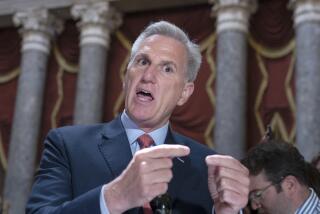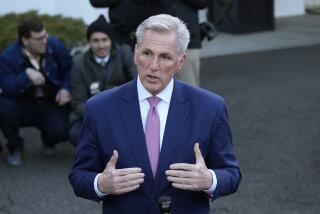Deficit super committee gets to work on Capitol Hill
- Share via
The first meeting of the super committee on deficit reduction opened in outwardly bipartisan fashion Thursday as it begins the daunting task of cutting federal deficits by $1.5 trillion by Thanksgiving.
The Democratic and Republican co-chairs, Sen. Patty Murray (D-Wash.) and Rep. Jeb Hensarling (R-Texas), entered the hearing room together. Hensarling chaired the meeting, but the co-chairs will alternate the responsibility, with Murray scheduled to lead the next one.
Several pink-outfitted protesters greeted the committee with signs reading “Tax the rich!” before being admonished to show decorum. Outside, protesters shouted “Jobs now!” and brought the meeting to a momentary standstill.
Hensarling said he approached the job with “urgency, high hopes and realistic expectations,” noting it “will not be easy.”
Murray said she was heartened that the 12 members, an equal number of Democrats and Republicans, had not publicly drawn lines in the sand.
“We must all be open to compromise,” Murray said.
Thursday’s meeting is largely an organizational one, as the committee sets rules and procedures. Every step in its formation over the last month has been a partisan dance, fraught with potential disagreement.
The panel was created from the deal Congress struck last month to raise the nation’s debt ceiling. It has less than three months to reach its goal of $1.5 trillion in deficit reduction over the next decade or mandatory spending cuts to defense and domestic programs will be made in 2013.
Both sides want to avoid that outcome. But past efforts have stalemated as Republicans refuse new taxes and Democrats resist cuts to Medicare and other entitlements without new revenue.
In a nod to emerging leaders on the panel, Republicans allowed Sen. Rob Portman (R-Ohio) to follow the chairs with the first opening statement. Portman is a former director of the White House Office of Management and Budget under President George W. Bush, and widely seen as a budget pro who understands the severity of the nation’s budget problems and the need for both tax and spending reforms.
The next meeting is set for Tuesday.
More to Read
Get the L.A. Times Politics newsletter
Deeply reported insights into legislation, politics and policy from Sacramento, Washington and beyond. In your inbox twice per week.
You may occasionally receive promotional content from the Los Angeles Times.











